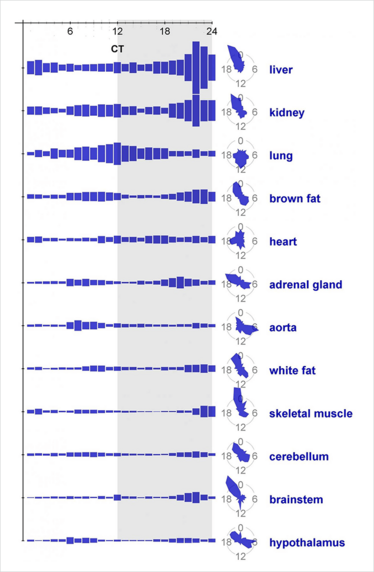Dosing to Circadian Rhythm
Could medicines be made more effective with better timing?
Zhang and colleagues have published an ‘atlas’ that maps the 24-hour patterns of expression for thousands of genes in different mouse organs (1). They also looked at the potential effect of the circadian clock on medicines and drug development; an examination revealed that the majority of bestselling drugs target proteins made from genes whose expression changes throughout the day. The data have been made publically available through the CircaDB database. John Hogenesch, a professor at the University of Pennsylvania’s Perelman School of Medicine, and lead researcher on the project, tells us more.

What inspired this study?
After the human genome project, it was clear there were only about 25,000 genes. After finding the genes, the first thing we wanted to know was where and when they were expressed. At Novartis, to get at this question, we did a large-scale ‘atlas’ of human, mouse, and rat gene expression in around 80 different organs. This became a public resource that is still used today - in Wikipedia or BioGPS. I was also interested in circadian time back then, but it wasn’t until this study that I have been able to more fully explore it.
What does your work tell us?
It tells us just how prevalent circadian clock influences are on physiology and behavior. We found that 43 percent of protein encoding genes are under clock-control in at least one tissue – and we estimate that 55 percent of the genome will be found to be clock controlled once all organs are analyzed. Surprisingly, we also found that almost 60 percent of drug targets were clock regulated. Many of these drugs have short half-lives and are taken as once-a-day formulations, meaning there is potential for time-of-day dependent metabolism or efficacy. For some medicines, such as low-dose aspirin, statins, and angiotensin receptor blockers, it’s known that time of day of dosing can have an impact on efficacy.
What are the implications?
At the very least, I hope it will emphasize to everyone that the time of dosing can be important. For example, short-acting statins should be taken before bedtime; it’s right there on the label. But one in six patients still take them in the morning.
When it comes to drug development, many companies are focused on long-acting formulations. One implication of clock regulation is that this longer exposure might not be better. If the system evolved to respond in a particular window of the day, putting your foot on the gas 24/7 might not be optimal. These issues need to be considered on a target-by-target, drug-by-drug basis.
What next?
We want to look at drugs with the biggest potential for time-of-day dependent effects – high-amplitude cycling of targets, their metabolizing enzymes or transporters – in organ systems of interest. We will use animal models to provide evidence supporting clinical studies to see if these already relatively safe and efficacious medicines can be further optimized. The payoff here could be huge: new drugs are expensive to develop and fail more often than not. These drugs already work. We want to see if they can work better with optimal timing.

- R. Zhang et al., “A Circadian Gene Expression Atlas In Mammals: Implications For Biology And Medicine”, PNAS 111(45), 16219-16224 (2014).

Making great scientific magazines isn’t just about delivering knowledge and high quality content; it’s also about packaging these in the right words to ensure that someone is truly inspired by a topic. My passion is ensuring that our authors’ expertise is presented as a seamless and enjoyable reading experience, whether in print, in digital or on social media. I’ve spent fourteen years writing and editing features for scientific and manufacturing publications, and in making this content engaging and accessible without sacrificing its scientific integrity. There is nothing better than a magazine with great content that feels great to read.



















